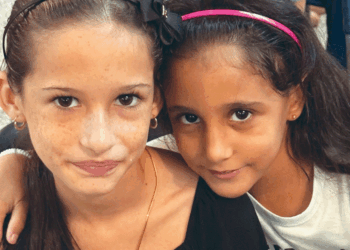Here’s a new list of commandments designed to strengthen the Jewish community from generation to generation
By RABBI YOSI GORDON
In her piece titled “A new Ten Commandments,” Archie Gottesman offered some gutsy rules intended to keep Judaism alive from generation to generation (12-10-10 AJW). At the end, she wrote that, if we readers have any issues, we should “write [our] own column.”
I agree (mostly) with her prescriptions. And I’m responding to her challenge — with only five commandments, which address my particular issues.
The pivotal decade in most lives are the years from 13 to 22. During this time, psychological and sociological research, along with so many people’s experiences, tell us that many of our children will develop a philosophy of life, make lifelong friends, join a peer community that will be the model for their adult community, choose a lifetime partner — or at least a serious partner that will take them in the direction of finding a more lasting relationship — decide where they may live, select a profession and modify their bonds with organized religion.
The implications are clear, to the degree you have any say in the matter: you must make every effort during those years to maximize the likelihood that your children will strengthen their Jewish commitment. Unfortunately, those are usually the years when your children drift away — from you, from Jewish institutions, from Judaism. Unless you do your best to change that, as Archie Gottesman wrote, “Does the thought of being invited to your grandchild’s baptism trouble you?”
1. Youth groups
As your influence wanes during your child’s adolescence, a new guiding force arises: the peer group. “My friends” becomes the determining force in your child’s life. Fine. Go with it. Get your child involved in a synagogue youth program. Carpool, carpool, carpool.
You don’t like the program? It’s not for you; it’s for your child. It’s other Jewish kids, usually very nice Jewish kids, doing Jewish and sort-of-Jewish things. The same goes for synagogue volunteer or for-pay leadership activities. They’re Jewish. Consider the alternative and sign your kid up.
2. More Hebrew school
As much as you and your kid loved pre-B’nai Mitzva Hebrew school (or did you?), post-B’nai Mitzva Hebrew school is essential. I know it may be a fight (personal disclosure: I teach post-B’nai Mitzva students at both Talmud Torahs), but it does make a difference.
At a Hebrew high school graduation I once attended, my student, giving the class address, announced, “My parents forced me, kicking and screaming, for five years, three days a week, to suffer this torture. And all I can say now is, ‘Thank you.’”
No, your kid may never offer such applause, but your child’s Judaism has to grow as your child grows. Thirteen-year-old Jewish learning is irrelevant to 18-year olds, just as eight-year-old Judaism is irrelevant to 13-year olds.
Do what you can do and keep your kids in Hebrew school. And make sure they attend regularly. Enrollment without regular attendance is pretty useless.
3. College
My cynical friend Kim Isaacs told me, some 40 years ago, that he would never allow his three children to go to college. Why not? Because, he said, if a diabolical genius wanted to devise a plan to destroy American Judaism, he would invent college: Take kids away from family, synagogue and community during the most decisive years of their lives; and put them in a place where all values are equal, where they can go for months without a significant conversation with anyone over the age of 22, in a land of 10,000 choices, and where serious Jewish commitment is regarded as philistine or déclassé. You don’t have to guess the consequences. You’ve seen them.
But your children are going to college, of course. (So did Kim’s, and they turned out just fine.) Where your child goes to college can make the difference between a lifetime of Jewish commitment and “I have some Jewish ancestry.” This is not about being narrow; there are probably 50 or more colleges and universities in America where your child can find the following: a significant Jewish student population; an active and identified Jewish student population; Jewish courses, beyond “Introduction to Judaism”; an excellent local Jewish community with ties to the Jewish students; an active Hillel Foundation; and an excellent education.
You need the whole set if you want it to work. Yes, I know that cousin Ginger’s daughter went to Kennebec Valley Community College in Maine and is now studying to become an ultra-Orthodox rabbi, but you can’t count on anything like that happening twice, or once. In this matter, play the odds.
4. Rebellion
“But if I push too hard, my child might rebel.”
No. You child will rebel. Whether you push too hard or not. Children rebel. That’s their job, just like it’s your job to push. You can’t stop your child from rebelling, but you have a lot to say about where that rebellion takes place.
Like any power source, adolescent rebellion seeks the path of least resistance — and maximum pain. If Judaism is your weak point, that’s where your child will rebel. If your weak point is keeping a neat house, then your child will convert a designer bedroom into a landfill. Show me a teenager with a messy room, and I will show you a teenager whose rebellion is almost tolerable. That means you’re winning.
5. Play to win
You don’t have the final word in this infinitely important matter, but you do have lots of little opportunities to make a difference throughout the pivotal years of 13 to 22. Don’t pass up any chance to keep your Jewish values alive in the next generation — and the next.
And, if you have any issues with my commandments, write your own column. And thank you, Archie Gottesman.
***
Rabbi Yosi Gordon is a teacher of Jewish and Hebrew studies in St. Paul and the Minnesota Rabbinical Association rabbi at the University of Minnesota Hillel Foundation.
(American Jewish World, 1.7.11)


















